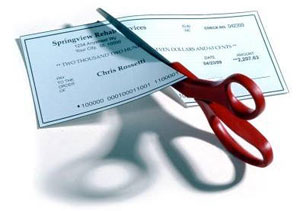 In yesterday’s Wall Street Journal, there was an article titled “Returning Workers Face Steep Pay Cuts“The article cites research by Kenneth Couch of the University of Connecticut that returning workers are taking on average a 40% pay cut from their old jobs. This is first and foremost a personal tragedy for those affected. The question we must ask as economists is why?
In yesterday’s Wall Street Journal, there was an article titled “Returning Workers Face Steep Pay Cuts“The article cites research by Kenneth Couch of the University of Connecticut that returning workers are taking on average a 40% pay cut from their old jobs. This is first and foremost a personal tragedy for those affected. The question we must ask as economists is why?
Econometricians will still be picking over the data a decade from now. (And of course, they will be looking at revised data, rather than the data we are viewing today. But that is a subject for another post.) One factor that must not be overlooked is that capital has been destroyed in the prior boom. The so-called bust or crisis is the revelation of those losses. Capital is heterogeneous. The capital embodied in all those unoccupied homes in Las Vegas cannot be deployed to build goods and employ workers in the manufacturing sector.
Many analysts, myself included, argue that economic recovery will involve a switch to a lower consumption path. In the process, proportionately more resources will be devoted to production of goods for rest of the world. New savings will be needed to finance that transition. But much accumulated savings have been lost due to capital misallocation. In order to be competitive in the global economy, the U.S. must become a country of lower wages. And we are witnessing that painful adjustment in real time.
The reflationists (whether monetary or fiscal) conflate cause and effect. Falling wages rates are the consequence of prior bad policies and decisions. They are not the cause of current problems. Moreover, fiscal and monetary stimulus cannot restore the lost capital. Printing money or redistributing income does not create real wealth.
Falling real wages and declining living standards put flesh on the skeleton of macroeconomic policy debates. They are the real-world consequences of bad macroeconomic policy: easy money, politically directed investment and regulatory capture. All those bad policies are being continued or enhanced. Only further misery will flow from them.
- Bulenox: Get 45% to 91% OFF ... Use Discount Code: UNO
- Risk Our Money Not Yours | Get 50% to 90% OFF ... Use Discount Code: MMBVBKSM
Disclaimer: This page contains affiliate links. If you choose to make a purchase after clicking a link, we may receive a commission at no additional cost to you. Thank you for your support!


Leave a Reply